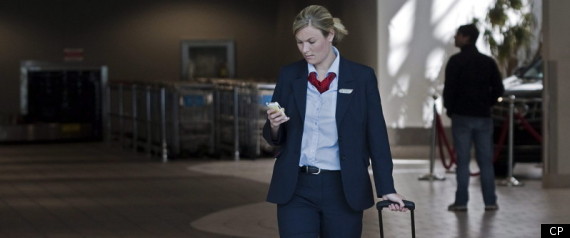 TORONTO - An escalating labour dispute at Air Canada is throwing the relationship between a union and its members into the spotlight after flight attendants rejected a deal negotiated by their representatives for the second time.
TORONTO - An escalating labour dispute at Air Canada is throwing the relationship between a union and its members into the spotlight after flight attendants rejected a deal negotiated by their representatives for the second time.Some 6,800 flight attendants also served strike notice which could see them walk off the job early Thursday morning — a move which raised questions about whether the Canadian Union of Public Employees really understood what its members want.
After its second proposed contract was tossed out over the weekend, Air Canada (TSX:AC.A) said it was "evaluating its options" Monday.
"We have to question the legitimacy of the union's representation and in this case the collective bargaining process," said spokesman Peter Fitzpatrick.
"The CUPE leadership has failed to secure ratification of two separate tentative agreements despite the company providing industry leading compensation and benefits. Recall that CUPE said this last offer met 80 per cent of its members' demands."
The airline was also keenly aware of the impact the dispute could have on its customers and said the ongoing issue was "damaging our business and bookings at a very fragile time."
Air Canada's flight attendants first rejected a tentative deal CUPE negotiated with the airline in August, forcing both sides back to the drawing board. The key areas of dispute were wages, pensions, crew rest, working conditions and work rules.
Those issues were thrown into sharp focus in September when the airline's senior vice-president of customer service sent an internal email urging flight attendants to buck up and accept the unpredictable nature of their jobs. Union leaders at the time said the email from Susan Welscheid backfired and further upset unhappy employees by showing the company wasn't listening to them.
The fact that the unionized flight attendants chose to reject a negotiated deal for a second time is significant, said PI Financial analyst Chris Murray.
"Does the union understand, does the union bargaining committee have the ability to actually come to a tentative agreement at this point?" he asked. "It certainly raises questions about their ability to bargain in good faith."
The union — which wasn't available for comment Monday — had said 65 per cent of members who voted rejected the deal, but didn't mention how many took part in the vote.
CUPE has also said the second rejection of a deal expressed just how frustrated flight attendants were with the airline after years of concessions and asked Ottawa not to intervene.
"We ask the federal government, in the strongest possible terms, to respect our right to collective bargaining," Jeff Taylor, president of CUPE's Air Canada division, said in a release.
But federal Labour Minister Lisa Raitt has said a work stoppage at Canada's largest airline would be "unacceptable."
"If the parties are unable to come to a solution, our government is prepared to act to protect Canada's fragile economy," Raitt said in a statement Monday. "All options are being considered, including proceeding with the legislation proposed in September, which remains on the House of Common's notice paper."
Despite Raitt's comments, NDP MP and finance critic Peggy Nash said her party would be opposed to back-to-work legislation if it were introduced.
"We think a better solution would be free collective bargaining, whereby the two parties have the ability to find a solution themselves," Nash said. "The government has other ways to assist in finding a solution."
Even Nash noted however that it was "unusual" for a group of workers to refuse to ratify a tentative deal not once, but twice.
"I think it speaks to the frustration amongst this group of Air Canada employees," she said. "That's why we think that there's all the more reason to find a negotiated solution because one that is imposed likely will miss the mark."
Industrial relations expert Mark Thompson warned that government intervention in the Air Canada dispute would further a risky precedent already set when Ottawa intervened to legislate other Crown corporation employees back to work this year.
"Once you start imposing a collective agreement, everybody is going to be trying to gain that system rather than do the job at the table," said the University of British Columbia professor emeritus.
"If it were just another collective bargaining dispute I'd say the membership has kind of rejected their leadership's judgement, but in this case, they know what's going to happen and they decide they'd rather take a chance with that than take the deal that's on offer."
While it hopes to avoid a work stoppage, Air Canada said it will maintain a partial schedule in the event of a strike.
This isn't the first labour dispute to hit the airline this year. After a walkout in June, Air Canada's customer service agents won an arbitration ruling implementing a hybrid pension system after earlier agreeing to a 20 per cent wage reduction for new hires.
Origin
Source:
No comments:
Post a Comment